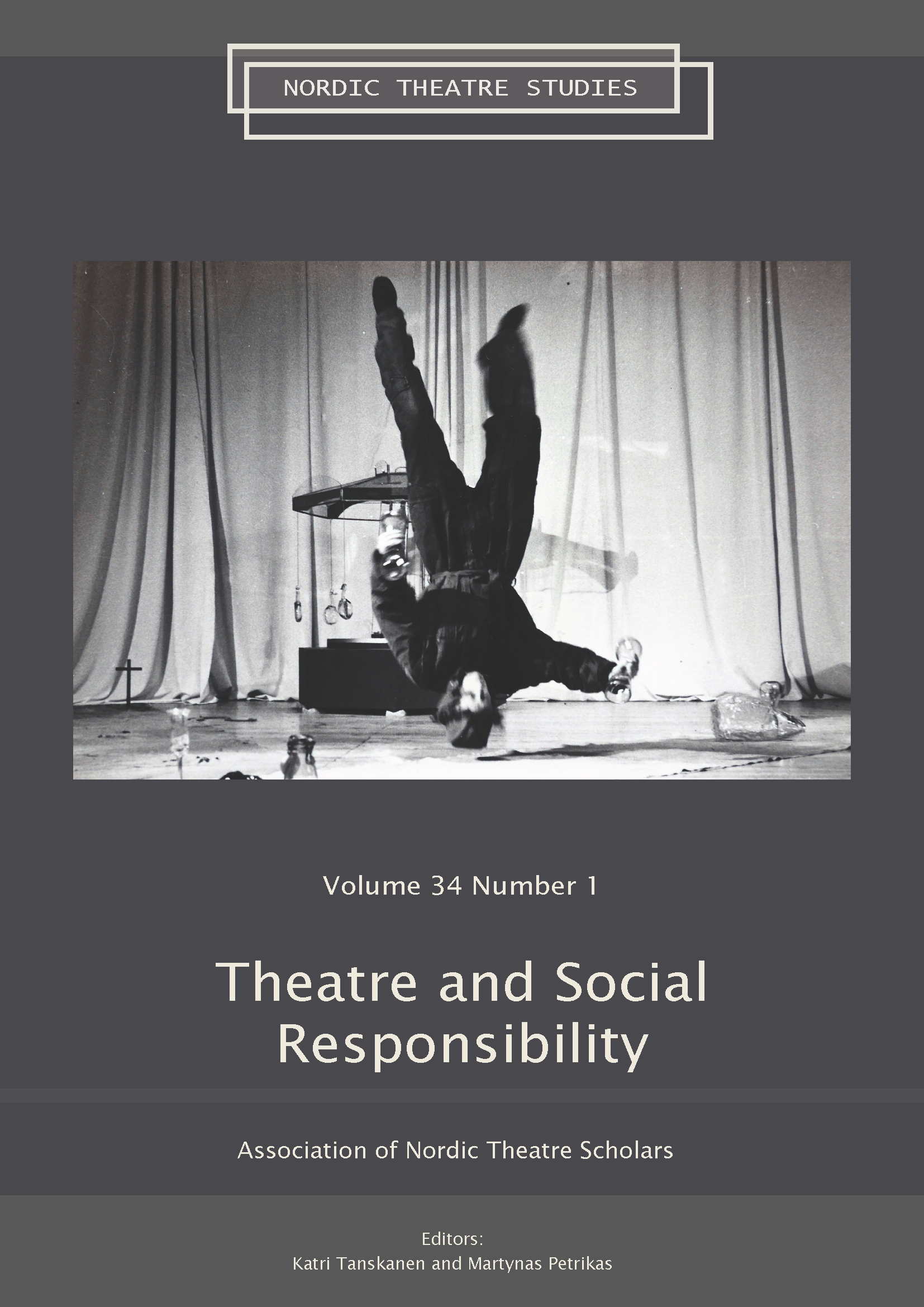Precarization in the Name of Freedom
Material Conditions for Early Independent
DOI:
https://doi.org/10.7146/nts.v34i1.137926Keywords:
independent performing arts, expansion period, material cultural policies, governmental precarization, interdependencyAbstract
This article is written within the frame of the interdisciplinary research project “Expansion and Diversity: Digitally Mapping and Exploring Independent Performance in Gothenburg 1965–2000”. It contributes to the critical ambition of producing an inclusive historiography of local independent performing arts groups by exploring the municipal distribution of cultural grants and the material conditions in the field. Based on interviews with nine well-known members of early independent performing arts groups in Gothenburg, complemented with archived funding applications and news articles, the article uses a cultural studies perspective to elaborate on how artistic freedom was negotiated in relation to dependence on public funding.
References
Ahearne, Jeremy. 2009. “Cultural Policy Explicit and Implicit: A Distinction and Some Uses.” International Journal of Cultural Policy 15:2, 141-53.
Andersson, Ylva M. 1989. “Det fria teaterlivet – slitjobb för svältlön.” Göteborgs-posten 11 November.
Blomgren, Anna-Maria and Roger Blomgren. 2002. Det ostyrbara pastoratet: teaterpolitikens nätverk, Uddevalla: University West.
Bourdieu, Pierre. 1993. The Field of Cultural Production: Essays on Art and Literature. Cambridge: Polity.
Braun, Virginia and Victoria Clarke. 2019. “Reflecting on Reflexive Thematic Analysis.” Qualitative Research in Sport, Exercise and Health 11:4, 589–97. https://doi.org/10.1080/2159676X.2019.1628806
Butler, Judith. 2009. Frames of War: When is Life Grievable? London: Verso.
Butler, Judith. 2015. Notes Toward a Performative Theory of Assembly. Cambridge, Mass: Harvard University Press.
Callery, Dymphna. 2001. Through the Body. London: Nick Hern Books.
Carlsson, Hasse. 1997. “Så dyr är fri kultur!” Göteborgs Tidning 22 October.
Couldry, Nick. 2000. Inside Culture: Re-Imagining the Method of Cultural Studies. London: Sage.
Cultural Policy Delegation Archive. 1979. The Regional Archive (Regionarkivet], Gothenburg.
Cultural Support Committee Archive (Kulturstödsnämndens arkiv). 1980–93. “Anslagsframställningar till kulturverksamhet”. The Regional Archive (Regionarkivet), Gothenburg.
Flisbäck, Marita and Anna Lund (eds.). 2010. Konst- och Kultursektorn: Ett Pionjärområde för ett Arbetsliv i Omvandling. Arbetsliv i Omvandling. Växjö: Linnéuniversitetet, Department of Social Sciences.
Flisbäck, Marita. 2017. “Konstnärligt Arbete – Entreprenörer eller Prekariat?” In Mattias Bengtsson and Tomas Berglund (eds.). Arbetslivet. Lund: Studentlitteratur, 512–24.
Forser, Tomas (ed.). 2007. “Institutioner, Fria grupper och Teatervanor.” In Tomas Forser and Sven Åke Heed (eds.). Ny Svensk Teaterhistoria: Vol 3: 1900-talets teater. Hedemora: Gidlund, 425–504.
Foucault, Michel. 1982. “The Subject and Power.” Critical Inquiry 8:4, 777–95. https://doi.org/10.1086/448181
Foucault, Michel. 1997. The Essential Works of Michel Foucault: 1954–1984. Vol. 1, Ethics: Subjectivity and Truth. London: Allen Lane.
Frenander, Anders (ed.). 2010. Arkitekter på armlängds avstånd. Att studera kulturpolitik. Borås: University of Borås.
Friberg, Ulf. 2014. Den Kapitalistiska Skådespelaren. Aktör eller Leverantör? Dissertation. Gothenburg: Bokförlaget Korpen.
Gothenburg Municipal Assembly (Göteborgs kommunfullmäktige). 1973. KUB 69: Utgångspunkter och mål för ett kommunalt kulturprogram för Göteborg. (KUB 69: Starting Points and Goals for a Municipal Cultural Program for Gothenburg). Gothenburg.
Hammergren, Lena. 2011. “Dance and Democracy in Norden.” In Karen Vedel (ed.). Dance and the Formation of Norden: Emergences and Struggles. Trondheim: Tapir Academic, 170–96.
Harding, Tobias. 2007. Nationalising Culture: The Reorganisation of National Culture in Swedish Cultural Policy 1970–2002. Dissertation. Linköping: University of Linköping.
Hoogland, Rikard. 2005. Spelet om teaterpolitiken. Dissertation. Stockholm: University of Stockholm.
Jackson, Alecia Youngblood and Lisa Mazzei. 2012. Thinking with Theory in Qualitative Research: Viewing Data Across Multiple Perspectives. New York: Routledge.
Johannisson, Jenny. 2006. Det lokala möter världen Kulturpolitiskt förändringsarbete i 1990‐talets Göteborg. Dissertation. Gothenburg: University of Gothenburg.
Karlsson, David. 2010. En kulturutredning – Pengar, konst och politik. Gothenburg: Glänta.
Lindström, Sofia. 2016. (Un)bearable Freedom: Exploring the Becoming of the Artist in Education, Work and Family Life. Linköping Studies in Arts and Science, 692, dissertation. Norrköping: Linköping University, Department for Studies of Social Change and Culture.
Lorey, Isabell. 2015. State of Insecurity. Government of the Precarious. London, New York: Verso.
Mangset, Per. 2009. “The Arm’s Length Principle and the Art Funding System: A Comparative Approach”. In Matti Pyykkönen, Niina Simainen, and Sakarias Sokka (eds.). What about Cultural Policy? Interdisciplinary Perspectives on Culture and Politics. Jyväskylä: Minerva.
McRobbie, Angela. 2016. Be Creative: Making a Living in the New Culture Industries. Cambridge: Polity Press.
Miscevic, Danka. 2014. Bortom Scenen – En Sociologisk Studie av Frilansande Skådespelares Villkor. Göteborg Studies in Sociology, 57, dissertation. Gothenburg: Department of Sociology and Work Science, University of Gothenburg.
Prop. 1974:28. Kungl. Maj:ts Proposition Angående den Statliga Kulturpolitiken [The Royal Majesty’s Bill Regarding State Cultural Policy].
Prop.1996/97:3. Kulturpolitik (Cultural policies).
Richardson, Laurel and Elizabeth Adams St. Pierre. 2018. “Writing: A Method of Inquiry.” In Norman Denzin and Yvonna Lincoln (eds.). The SAGE Handbook of Qualitative Research. Los Angeles: Sage, 818–38
Sondén, Bengt. 1988. “Svårt för bidragsspelets förlorare.” Göteborgs-posten. 3 October.
SOU 1972:66. Ny Kulturpolitik. Nuläge och förslag (New Cultural Policies: Current Situation and Suggestions).
SOU 2009:16. Betänkande av Kulturutredningen (Consideration from the Public Investigation of Culture Policies).
Svenska Dagbladet. 2005. “Ridå för Teater Bhopa.” 14 December.
Sylwan, Mats. 1988. “Staten och de fria grupperna.” In Statens Kulturråd. Kulturrådet: Statens Kulturråd Informerar, no 2, 33–38.
Swedish Agency for Cultural Policy and Analysis (Myndigheten för Kulturanalys). 2022.“Konsten och Kulturens Frihet i Norden: En Kunskapsöversikt med Utgångspunkt i Forskningen (The Freedom of Art and Culture in the Nordic Countries. A Knowledge Review Based on Research). Available online https://pub.norden.org/nordiskkulturfakta2022-03/# (Accessed 19 April 2022).
von Rosen, Astrid. 2018. “Dansgruppen Rubicon och den fria dansens genombrott i Göteborg.” Arche 64–65, 186–97.
von Rosen, Astrid. 2022. “Affect and digital caregiving: Challenging the performing arts canon with a ‘dig where you stand’ database”. Archives and Records 43:2, 128–42. https://doi.org/10.1080/23257962.2022.2031932
Downloads
Published
Versions
- 2023-07-05 (2)
- 2023-06-20 (1)
How to Cite
Issue
Section
License
The copyright belongs to the authors and Nordic Theatre Studies. Users can use, reuse and build upon the material published in the journal but only for non-commercial purposes. Users are allowed to link to the files, download the files, distribute the files on a local network (preferably by links), upload the files to local repositories if their institutions require them to do so, but not republish the files without proper agreements with the journal and the author.

